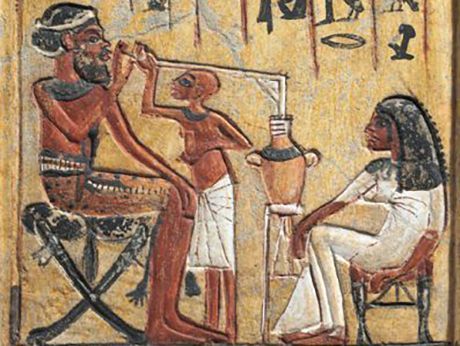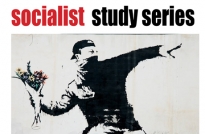Features
You are here
A people's history of beer

November 14, 2014
To paraphrase the great dialectical philosopher, Homer J. Simpson, beer is the cause of, and the solution to, all of life's problems.
The human species arose between 100,000 and 200,000 years ago. Up until around 10,000 years ago we all lived in small bands of hunters and gatherers. Many people continued in this sort of society up until very recent times.
Pre-class society
The life of foraging societies was very different from our own. Enough food could usually be gathered within two to three hours per day. Even this work would be very different from our own conception of work: the methods, timing and organization would all be decide on by the participants, no one was forced to get out of bed in the dark to commute in the rain to a job that existed only to create wealth for our bosses.
Since foraging societies moved frequently, personal wealth would be limited to what one could carry. There was no possibility of a small number of people controlling the wealth of society for their own ends. As Engels writes, without a ruling class and a state to protect its interests there were “No soldiers, no gendarmes or police, no nobles, kings, regents, prefects, or judges, no prisons, no lawsuits—and everything takes its orderly course. All quarrels and disputes are settled by the whole of the community affected.” If there was no way to resolve the differences, one group could always just up and leave. The result was a very egalitarian society.
There was also no sexism and oppression of women as we now know it. Some tasks were typically carried out by men or by women, but there was no ranking of work, no assigning of low valued work to women and high prestige work to men. The work that in our society is given low value (that is low wages) caring for children, cleaning, cooking, would have been the major occupations of most people in a foraging society. Work and leisure would blend into each other in a way that is impossible in a society like ours that is dedicated to profit.
No sexism, no bosses, no employment, no homelessness, no war; but also, alas, no beer.
Beer
The ability to brew beer marks the most important turning point in human history. To understand why, you need to know a little about the process of producing beer from grain and water.
If you take grain and add water, it will sprout. If, just as it starts to sprout, you roast it, all the enzymes that were about to turn the starch into sugar to feed the new plant will be preserved in place. Now you have malt. The next step is to grind up the malt and add it to warm water for an hour or so. During this time the enzymes will wake up and convert the starches in the grain into sugar. If you drain off the water, you will also get lots of sugar. This liquid is called wort. Huck some yeast into the wort and they will eat the sugar, piss out alcohol and fart carbon dioxide. This creates beuatiful, intoxicating, bubbly, beer. With modern methods you will get around 3 1/2 litres of beer for every kilogram of grain. Older methods would produce less beer per kilo of grain.
Our foraging ancestors would only have had access to wild grains, and if they were moving often, even if they could have found enough grain to brew beer, carrying the beer or the grain around with them would have been an onerous task.
Sometime around 10,000 years ago, some of our ancestors stopped foraging and started farming. When they did this they created a much more reliable source of food, and the ability to produce more food than they needed for their immediate needs. They also created a society that required much more work from its members than the previous foraging societies.
Eventually these societies would change even further. The excess food that could be produced by agriculture meant that that people producing other things could be supported by agricultural workers. It also meant that people who produced nothing could be supported by the work of farmers. This allowed the growth of art, philosophy and science. Ominously, it also meant that is was now possible to have a small ruling class who produced nothing themselves, but lived at the expense of the majority. The surplus food could also be stored which meant it could also be stolen, and so a need for arms and armed men arose. The combination eventually lead to kings and queens and courts and all of the hierarchy and brutality that that entails.
Settling down in houses alongside their fields also meant a drastic change in the relations between men and women. The field, the house, and the things in the house eventually became private property. Over time, the men became the outdoor workers, in the field, and the women became confined to indoor occupations in child rearing and caring for the home. A settled society can have many more children than a foraging one, because there is more food, but also a family can have more young children then they can carry. This increases the need for child care, and increases the work necessary to look after the home. This division of labour between men and women left the men in charge and the increase in private wealth created the idea of inheritance.
Engels explains it like this: “The first class opposition that appears in history coincides with the development of the antagonism between man and woman in monogamous marriage, and the first class oppression coincides with that of the female sex by the male . . . together with slavery and private wealth, it opens the period that has lasted until today in which every step forward is also relatively a step backward, in which prosperity and development for some is won through the misery and frustration of others.” That division into classes and the oppression of women remains with us today.
What would drive foragers to the toil and drudgery required by settled agriculture? In a settled society, farmers can produce a lot of grain. Societies that farm grain can, and do, produce beer. Beer is the explanation for the change to settled agriculture. Only by planting and caring for crops could you ensure that there was enough grain to make beer.
There is plenty of evidence that beer brewing started along with agriculture and for most of our history has been a woman's profession. Our oldest surviving records contain references to beer and women brewers. The Code of Hammurabi, the oldest surviving code of laws from Babylon was written almost 5000 years ago. Among other things it sets the price of beer in grain and refers to beer brewers as women. Around 4000 years ago the people of Sumer wrote the The Hymn to Ninkasi which includes the instructions for how to make beer amongst its praise of Ninkasi the goddess of beer. The Egyptian hieroglyphic for food includes a pitcher of beer, and the women brewers of ancient Egypt developed a range of beer styles. The mesoamerican civilizations of the Aztecs and the Mayan drank beer brewed by aristocratic women. Up until the end of the medieval period in Britain, brewing by women was so prevalent that laws regulating the trade used the word for female brewers exclusively.
Professional anthropologists may protest that turning to settled agriculture would have been for a myriad of reasons and needs a much more nuanced explanation then just the need for beer. But professional anthropologists are almost all wine-drinking university professors, and can you trust the judgment of some one who prefers wine over beer?
We owe the rise of class society and all the wonders and horrors it has produced to our ancestors' thirst for good beer. Now let's raise a glass to a future world without class and oppression, “To capitalism! And it's hasty demise!”
This is the first in a series of articles on beer in history. Future articles will look at the way women were driven out of the profession of brewing in Britain during the transition from feudalism to capitalism, and how the history of the 19th century British beer industry illustrates the laws of Marxist economics.
Section:










